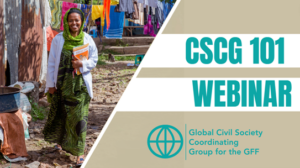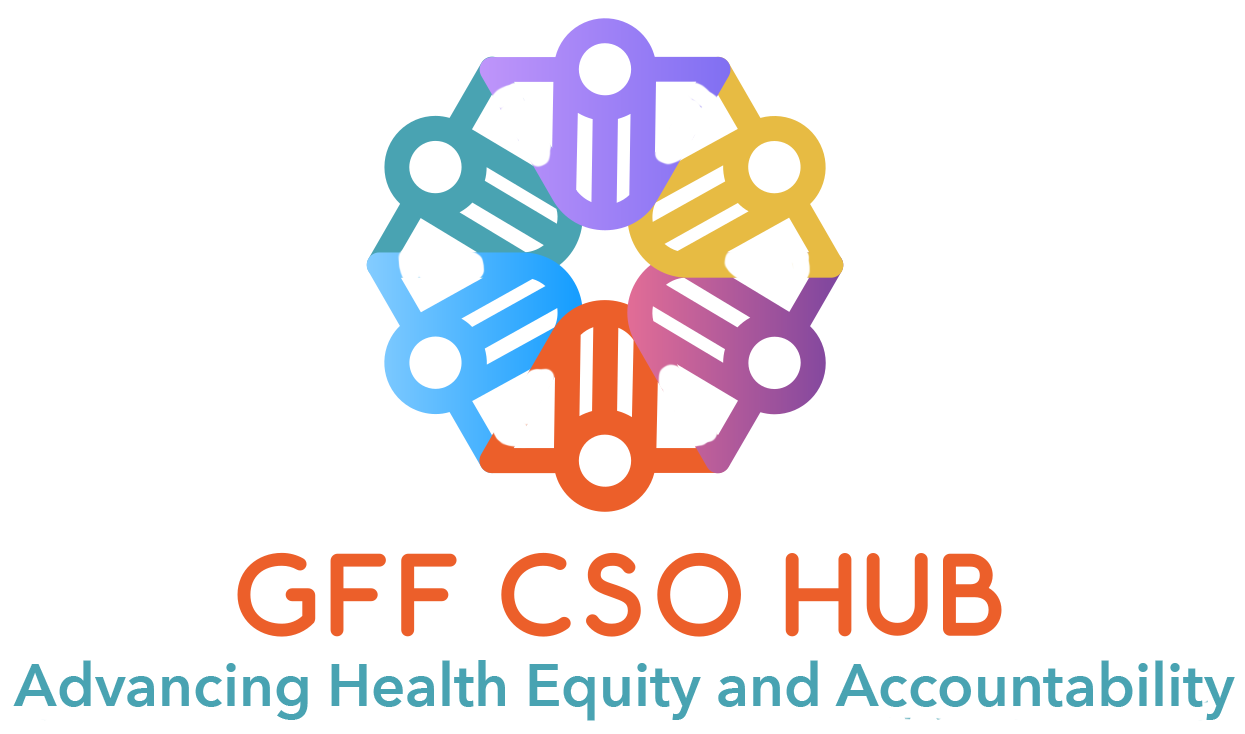Tuesday, April 25, 2023 – (Zoom)
CSCG Webinar on Roles, Functions and Impact of Civil Society and Youth Engagement for the Global Financing Facility [Click here to watch the recording of the event on Youtube].
Introduction
On April 25, 2023, the Global Civil Society Coordinating Group (CSCG) for the Global Financing Facility (GFF) held an online orientation webinar on civil society and youth engagement for the GFF. The webinar covered the CSCG’s role, the GFF’s engagement with civil society and youth and how organizations can benefit from joining the group.
The CSCG was established in 2015, in response to a call from civil society representatives working on the GFF for a global coordinating group. It is a global network of civil society organizations (CSOs) and youth actors working to shape investments and priorities in the GFF, with the mission to advocate for policies that support universal health coverage and promote meaningful civil society and youth engagement in the GFF.
The group aims to ensure that at-risk communities have a voice in decision-making processes related to sexual, reproductive, maternal, newborn, child and adolescent health and nutrition (SRMNCAH-N) and that their perspectives are accounted for when developing policies and programs. Overall, the CSCG plays a vital role in promoting inclusive and transparent multistakeholder platforms to support the Every Woman Every Child (EWEC) Global Strategy and the interventions by the GFF to advance women’s, children’s and adolescents’ health.
Webinar Overview
Maziko Matemba, principal representative of the GFF Investors Group (IG) and director of Health and Rights Education Programme (HREP Malawi), opened the webinar by introducing the CSCG and emphasizing the importance of civil society and youth engagement in achieving universal access to SRMNCAH-N coverage. He also stressed the need for greater collaboration between civil society and youth organizations and other GFF and global health stakeholders to ensure that everyone has access to quality health care.
The keynote address was delivered by Dr. Aminu Magashi Garba, coordinator and CEO of Africa Health Budget Network (AHBN) in Nigeria and a founding member of the CSCG. He provided an overview of the origin and development of the CSCG, explaining that the group was established in 2015 to provide a platform for CSOs to engage with the GFF and ensure that civil society and youth voices are heard in decision-making processes. He also highlighted key achievements of the CSCG over the past few years, including its role in shaping GFF policies and programs.
Maty Dia, partnership manager at the GFF Secretariat, then introduced the various pillars of the GFF’s CSO and Youth Engagement Framework and the range of GFF global- and country-level actions and initiatives that target civil society and youth engagement and are implemented with civil society and youth partners, such as the GFF NGO Host at PAI, the Joint Learning Agenda and the Incentives Program.
In her presentation, Dia underlined the importance of civil society and youth engagement and monitoring to ensure tangible and concrete results. She also discussed some of the challenges that CSOs and youth-led organizations (YLOs) face when engaging with governments and other stakeholders.
Finally, the GFF Secretariat concluded its intervention by highlighting the kickoff of the GFF 2023 Resource Mobilization Campaign, held under the patronage of the governments of Côte d’Ivoire, Germany and the Netherlands.
CSCG leaders and GFF NGO Host representatives discussed their roles and functions in coordinating civil society engagement for the GFF. This involved civil society and youth representatives in the Investors Group and CSCG Working Groups leaders, including Civil Society Investors Group Alternate Representative Jackie Katana, CSCG Capacity-Building and Country Engagement Working Group Co-Chair Christina Chilimba, CSCG Steering Committee Members Tasnia Ahmed and Abebe Kebede and GFF NGO Host Representative Christina Wegs — all of whom emphasized how coordination and sustained engagement are essential to ensuring that CSOs and YLOs are able to effectively engage with the GFF, country governments and other stakeholders. They also highlighted some of the key challenges that they face, including limited resources and capacity constraints.
Throughout the webinar, attendees had the opportunity to ask questions and engage in discussions with the speakers. The questions and answers session, moderated by CSCG Health Financing Working Group Co-Chair Leonora Mbithi, covered a range of topics, including eligibility for CSO and YLO partnership grants, membership criteria and required steps to join CSCG working groups, the role of youth in civil society engagement as well as strategies for overcoming capacity constraints.
Another important takeaway was the need for greater collaboration between CSOs and other stakeholders. The speakers highlighted that effective collaboration requires building trust, sharing information and working together toward common goals.
The speakers emphasized that addressing these challenges requires a multifaceted approach that involves building partnerships, leveraging technology and advocating for policy change.
The webinar further underscored the importance of youth engagement in civil society initiatives. The speakers highlighted that young people have a unique perspective on health issues and can bring fresh ideas and energy to advocacy efforts. They also stressed the need to ensure that young people are meaningfully engaged in decision-making processes at all levels.
Finally, the webinar provided information on useful resources for CSCG members and partners, including:
1. Access to resources: The CSCG provides access to a range of resources related to civil society engagement in the GFF, including toolkits, reports and case studies. These resources can help members and partners stay informed on best practices and emerging trends in civil society engagement.
2. Capacity-building support: The CSCG offers capacity-building support to its members and partners, including training sessions and mentorship programs. These initiatives can help build the skills and knowledge needed to effectively engage with governments and other stakeholders.
3. Networking opportunities: The CSCG provides networking opportunities for its members and partners through events such as webinars, workshops and conferences. These events provide a platform for CSOs to connect with each other and share their experiences.
4. Advocacy support: The CSCG provides advocacy support to its members and partners by helping them develop advocacy strategies, providing technical assistance on policy issues and facilitating engagement with decision-makers.
5. Funding opportunities: The CSCG provides information on funding opportunities for CSOs working in the area of maternal and child health. This information can help members and partners identify potential sources of funding for their initiatives.
Overall, the CSCG provides a range of useful resources and support services to its members and partners. By taking advantage of these offerings, CSOs can strengthen their capacity to effectively engage with governments and other stakeholders in achieving the health-related sustainable development goals.
Key Takeaways
The CSCG 101 Webinar provided attendees with a comprehensive overview of existing opportunities and platforms for civil society and youth engagement with the GFF and a range of insights and recommendations on how CSOs can effectively engage with governments and other GFF stakeholders. These recommendations included:
1. Strengthening civil society and youth engagement in decision-making processes at all levels, including global, regional, national and local.
2. Building partnerships and collaborations between CSOs, governments and other stakeholders to ensure that everyone has access to quality health care.
3. Leveraging technology to facilitate civil society engagement and improve access to primary health care services and SRMNCAH-N. Speakers recommended exploring innovative solutions such as telemedicine and mobile health applications for constructive advocacy.
4. Advocating for policy change at all levels to ensure that primary health care systems are responsive to the SRMNCAH-N needs of at-risk communities.
5. Investing in youth engagement initiatives to ensure that young people are meaningfully engaged in decision-making processes related to universal health coverage and the strengthening of primary health care and health systems.
Organizations and individuals interested in joining and staying connected with the CSCG are invited to consult and make use of the following resources:
1. The CSCG webpage provides a wealth of information on civil society engagement in the GFF, including news updates, resources and information on upcoming events.
2. The CSCG is active on social media platforms such as Twitter and YouTube, where you can stay up to date on the latest news and events related to civil society engagement in the GFF.
3. You can sign up for CSCG email updates to receive regular updates from CSCG on news, events and resources related to civil society engagement in the GFF.
4. The CSCG has several working groups focused on specific areas of interest, such as on accountability. It is a great way to connect with other CSOs and contribute to ongoing initiatives.
5. The CSCG hosts regular events, including webinars and workshops. You can watch recorded events on the CSCG YouTube channel.
Additional Information
Watch the full recording of the CSCG 101 webinar here. (For subtitles, please activate closed-captions (CC) and select the auto-generated language of your choice.)
The full webinar presentation slide deck is available here. (La présentation en français est disponible ici).
More information on the CSCG is available here.

CSCG – 2023
